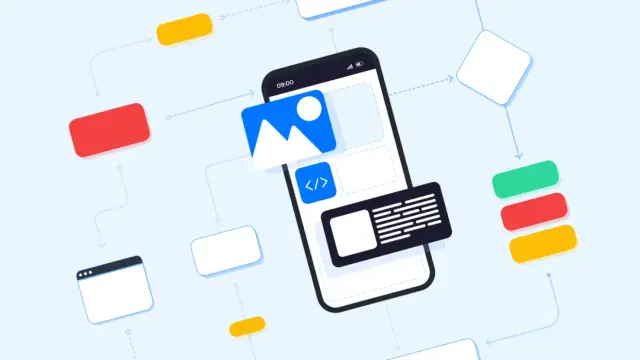How to Choose the Right Zerocode Platform for Your Business
Make informed decisions when choosing the right no-code platform for your business. This comprehensive guide explores key factors to consider, top vendors, and tips for success.

Choosing the right Zerocode ( no-code) platform for your business is a crucial decision that can significantly impact your development process and overall success. With the rapid growth of Zerocode tools and frameworks, there is a wide range of platforms available, each offering unique features and capabilities.
However, navigating through this sphere can be overwhelming and challenging. This blog article will guide you in selecting a platform that aligns with your business goals, project requirements, and team's expertise. We'll explore important factors, key features, and practical tips to ensure a successful selection process. Whether you're a startup, mid-sized company, or enterprise, this guide will provide the knowledge you need to make an informed decision and leverage Zerocode effectively.
Key Factors to Consider
When searching for the ideal no-code platform for your business, it's critical to assess specific factors that influence the effectiveness of the chosen solution. Here are some key factors to consider when evaluating your options:
Ease of Use and Learning Curve
No-code platforms are intended to simplify the development process and be accessible to non-programmers. Ensure that the chosen platform is user-friendly and provides a seamless learning experience for your team. The platform should have an intuitive interface, well-organized documentation, and accessible tutorials to facilitate quick onboarding for users with limited technical expertise.
Flexibility and Customization
Although no-code platforms strive to suit various business needs, you may require specific customizations to achieve your desired functionality. Consider platforms that offer a high degree of flexibility in design and features to accommodate changes as your business grows or evolves.

Scalability
A crucial factor when selecting a no-code platform is its scalability potential. The platform should be designed to handle increased workload and user demands as your business expands. Check the vendor's documentation for details on the platform's capacity to accommodate your current and future application requirements.
Integration Capabilities
A key benefit of no-code platforms is their ability to integrate with third-party tools and services. Evaluate the platform's compatibility with the systems and tools your business relies on, such as CRM, analytics, or payment processors. Platform interoperability allows a cohesive software ecosystem and automates workflows, increasing overall efficiency.
Vendor Support
When adopting a new technology, the level of support provided by the vendor plays a crucial role in overcoming potential challenges. Choose a platform backed by a responsive support team that offers resources like tutorials, community forums, and technical assistance to help with solution implementation and troubleshooting.
Pricing
No-code platforms vary in pricing based on features, resources, and usage levels. Explore different pricing options, including free trials and paid subscriptions, to find a suitable option for your needs and budget. Consider both upfront costs and long-term expenses throughout the platform's lifecycle.
Top Zerocode Platform Vendors
The zerocode development market is growing rapidly, with many platforms offering a wide variety of features and capabilities. Below are some popular no-code platform vendors:
- Appian: Known for its strong focus on business process management, Appian offers a well-designed, integrated no-code solution that combines process automation, AI, and analytics.
- OutSystems: OutSystems is a low-code platform that provides an intuitive visual interface for building and deploying complex applications quickly. Their platform emphasizes reusability, best practices, and collaboration.
- Mendix: Mendix bridges the gap between no-code and low-code development through a powerful visual modeling environment, enabling both developers and non-programmers to collaborate on application development.
- Bubble: Bubble is renowned for its ability to build web and mobile applications with a high degree of customization and flexibility, making it an attractive choice for entrepreneurs and startups.
- Wix: Wix is a popular no-code platform for building websites, blogs, and e-commerce sites with a focus on design and user experience. It also offers the Wix App Builder for creating mobile apps.
- Webflow: Webflow offers a responsive web design platform with a powerful visual CSS editor. It allows users to create fully custom web applications by designing layouts and styles without coding.
Each of these vendors' platforms has its own unique strengths and capabilities. Assess the aforementioned factors when considering the vendors to ensure they align with your specific business needs and requirements.
AppMaster: A Powerful No-Code Solution for Businesses
AppMaster is a leading no-code platform that offers comprehensive capabilities for creating backend, web, and mobile applications. The platform provides powerful tools to design and deploy applications with minimal coding expertise, making it suitable for a wide range of businesses. Here are some of the key features and advantages of choosing AppMaster:
Visual Modeling and Business Process Design
AppMaster allows users to visually create data models and business logic using its intuitive Business Process (BP) Designer. This enables businesses to develop applications more efficiently, without the need for specialized programming skills.
Customization and Flexibility
The platform offers enhanced customization options, enabling users to create web and mobile app interfaces with drag-and-drop functionality. The business logic for every component can be designed with the Web and Mobile BP designers, allowing applications to be fully interactive and adaptable to diverse requirements.
Speed and Efficiency
Using AppMaster, businesses can develop and deploy applications up to 10x faster and 3x more cost-effectively than traditional methods. By eliminating technical debt and regenerating applications from scratch when requirements change, the platform empowers even a single citizen developer to create comprehensive software solutions that include server backend, websites, customer portals, and native mobile applications.
Scalability and Integration
AppMaster generates applications that can work with any PostgreSQL-compatible database and demonstrate remarkable scalability for enterprise and high-load use-cases. This makes it ideal for businesses seeking a solution that can grow along with their needs.
No-code to Full-code Possibilities
The platform generates real applications, complete with source code and executable binary files, making it a versatile solution. Users can start with no-code development and transition to full-code when necessary, catering to various levels of technical expertise within teams.
AppMaster is a powerful and flexible no-code solution for businesses looking to develop applications efficiently without compromising on quality and functionality. From small business to enterprise-scale projects, AppMaster offers an accessible and powerful platform for application development.
Steps for Successfully Implementing a Zerocode Platform
Implementing a no-code platform in your organization requires careful planning and execution to achieve the desired results. Here's a step-by-step guide to get the most out of your chosen no-code platform:
- Define your goals and requirements: Begin by clearly outlining your project goals and requirements. Identify the applications you plan to create and the features you need. This step will help you understand which no-code platform is the best fit for your business.
- Evaluate and select the right platform: Evaluate the available no-code platforms based on your goals and requirements. Consider factors such as ease of use, customization, scalability, integration capabilities, vendor support, and cost. Be sure to explore AppMaster, a powerful and scalable no-code tool that offers comprehensive features for creating backend, web, and mobile applications.
- Invest in training and documentation: Although no-code platforms are designed for users without coding experience, some training and documentation would come in handy. Invest in resources that help your team understand how to make the most of the platform. Most no-code providers offer tutorials, webinars, and community forums to assist in the learning process.
- Design workflows and processes: Once you have a clear understanding of the platform's capabilities, design the workflows and processes you want to implement in your applications. Ensure that your team is on the same page when it comes to the application's structure, user experience, and features.
- Test early and often: Perform thorough testing during the development process. Identify any issues and make necessary adjustments before the applications are deployed. Frequent testing helps mitigate risks, simplify troubleshooting, and ensure that the end product meets your expectations.
- Gather and analyze feedback: After deploying your applications, collect feedback from users. This information will help you gauge the application's performance, user experience, and areas for improvement.
- Iterate and improve: Use the feedback gathered to further refine your applications, processes, and workflows. Continuously iterate and improve to keep up with changing requirements and maintain a competitive edge.
Conclusion
Choosing the right Zerocode platform for your business is a critical decision that can greatly impact your development process and overall success. With the wide array of Zerocode tools and frameworks available, it's important to navigate this sphere effectively. This article has provided a comprehensive guide to help you choose a platform that aligns with your business goals, project requirements, and team's expertise.
By considering factors such as ease of use, customization options, scalability, integration capabilities, vendor support, and pricing, you can make an informed decision that aligns with your specific needs. Additionally, exploring popular Zerocode platform vendors like AppMaster, Appian, OutSystems, Mendix, Bubble, Wix, and Webflow can provide you with a range of options to consider.
FAQ
Zerocode (no-code) platforms are software development solutions that allow users to build web, mobile, and backend applications without writing code. These platforms typically utilize visual development tools, dragging and dropping elements, and pre-built templates to create applications quickly and easily.
Key factors to consider include ease of use, flexibility and customization, scalability, integration capabilities, vendor support, and cost.
No-code platforms are designed for users without coding experience, while low-code platforms typically allow for more customization and may require some programming knowledge. No-code platforms are generally faster and more accessible, while low-code platforms offer greater control over the development process.
Consider the types of applications you need, your team's technical skills, project timelines, and budget. No-code platforms can be ideal for businesses seeking to quickly develop applications with minimal coding expertise, while low-code platforms may be better suited for organizations with more specialized technical requirements.
Many zerocode platforms are designed to be scalable and can support the growth of your business. Be sure to research the platform's scalability features and consider your future application requirements when making your decision.
Most no-code platforms offer integration capabilities and support for connecting to other systems and tools. Verify the platform's integration capabilities and any limitations before choosing a vendor.
AppMaster is a powerful no-code tool for creating backend, web, and mobile applications. It allows users to visually create data models, business logic, and user interfaces, and generates real applications, including source code and executable binary files. AppMaster also offers excellent scalability and integration capabilities, making it a top choice for businesses of all sizes.
Zerocode platform pricing varies depending on the vendor, features, and resources allocated. Many platforms offer free or trial accounts, while others may require a paid subscription. Consider your needs, budget, and future growth when comparing pricing options.






